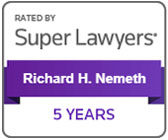Why It Is Important To Disclose Any Potential Lawsuit You May Have In Your Bankruptcy Schedules
Why It Is Important To Disclose Any Potential Lawsuit You May Have In Your Bankruptcy Schedules

A new case decided by the Sixth Circuit Court of Appeals, which is the federal court of appeals that covers Ohio, illustrates why it is important to always list any lawsuits or potential lawsuits you may have when you file your bankruptcy. Lawsuits and other claims are assets which must be disclosed in your asset schedules.
There is a legal principle known as “judicial estoppel” which essentially says that you cannot have it both ways. You cannot fail to disclose an asset in your bankruptcy legal proceeding and then later try to collect on that asset in a lawsuit against someone who has caused you harm. If you do, the attorneys that represent the person or company you are suing will raise the defense of judicial estoppel and your claim will be dismissed.
In a newly-decided case out of the Sixth Circuit, Auday v. Wet Seal, a woman who had filed a bankruptcy case failed to list on her schedules that she had a claim against her former employer for wrongful termination based on age discrimination. However, her attorney contacted the bankruptcy trustee and requested permission to be made counsel for the trustee so that the attorney could pursue the claim. The trustee sought and was granted approval by the bankruptcy court to proceed against the former employer. Note that the claim belongs to the bankruptcy trustee, not the debtor. In this case, the bankruptcy trustee failed to pursue the claim. The debtor received her discharge in bankruptcy and her bankruptcy case was closed. This is where it gets interesting.
Normally if a claim or other asset is listed in the bankruptcy schedules, and the bankruptcy case is closed, all assets that have not been taken by the trustee go back to the debtor who is then able to pursue those claims against the wrongdoer. However, this court held that if the claim is not listed in the bankruptcy schedules, then it is not abandoned by the trustee. The court ruled that the debtor did not have standing to pursue the claim because she did not disclose it in her schedules. However the court held that the trustee still had authority to pursue the claim and sent the case back down to the lower court for further disposition.
The bottom line is this: if the debtor had listed this claim in her schedules, she would have been able to pursue it on her own and keep all of the settlement or award. Because she did not list it, the trustee will pursue it for the benefit of creditors and give her creditors the award or settlement. If enough money is awarded she may receive the excess, but she missed the opportunity to keep all of the money for herself.

